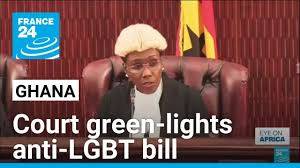**Ghana Supreme Court Rejects Legal Challenges to Anti-LG7BT Bill**
In a landmark decision that has drawn significant attention both domestically and internationally, Ghana’s Supreme Court dismissed legal challenges to the controversial anti-LGBTQ+ bill, formally known as the “Promotion of Proper Human Sexual Rights and Ghanaian Family Values Bill.†The ruling clears the way for the proposed legislation to move forward in Ghana’s parliamentary process, sparking fresh debate over the intersection of human rights, cultural values, and legal principles in the West African nation.
### The Controversial Anti-LGBT Bill
First introduced in 2021, the bill has been at the center of heated discussions in Ghana. It seeks to criminalize LGBTQ+ activities, advocacy, and support networks, with penalties that include lengthy prison sentences. The bill also targets those who promote or advocate for LGBTQ+ rights, creating a chilling effect on freedom of expression and activism in the country. Supporters of the legislation argue that it reflects Ghana’s cultural and religious values, which overwhelmingly oppose LGBTQ+ practices. Critics, however, have condemned the bill as a violation of fundamental human rights, including freedoms of expression, association, and privacy.
The bill has faced resistance not only from local LGBTQ+ advocates and human rights organizations but also from the international community. Several global entities, including the United Nations and Amnesty International, have urged Ghana to reconsider the legislation, warning that it contravenes international human rights agreements to which the country is a signatory. Despite this pressure, the bill has garnered widespread support among Ghanaians, many of whom view it as a defense of traditional values and societal norms.
### Legal Challenges and Supreme Court Ruling
The legal challenges to the anti-LGBTQ+ bill were initiated by a coalition of human rights groups and individual activists, who argued that the proposed law violated constitutional protections. Specifically, they contended that the bill infringed upon rights guaranteed under Ghana’s 1992 Constitution, such as the right to equality, freedom from discrimination, and freedom of speech.
The plaintiffs asked the Supreme Court to strike down the bill, arguing that its provisions were not only unconstitutional but also inconsistent with Ghana’s commitments under international human rights law. They further asserted that the bill’s punitive measures would exacerbate stigmatization and violence against LGBTQ+ individuals and their allies.
However, in a unanimous decision, the Supreme Court rejected these arguments, ruling that the legal challenges were premature. The court emphasized that the bill had not yet been passed into law and therefore could not be subject to judicial review. Chief Justice Gertrude Torkornoo stated that while the court has the authority to interpret the constitution, it could not interfere in the legislative process unless a law was formally enacted.
The ruling was seen as a procedural victory for proponents of the bill, who argue that it represents the will of the people and must be allowed to go through the legislative process without judicial interference. However, it was a major setback for LGBTQ+ advocates and their allies, who had hoped the court would intervene to halt the bill’s progress.
### Reactions and Implications
The Supreme Court’s decision has drawn mixed reactions. Supporters of the bill, including religious and traditional leaders, celebrated the ruling as a triumph of Ghanaian sovereignty and cultural identity. They argue that the legislation is necessary to protect the moral fabric of society and to resist external pressures to adopt values they see as incompatible with Ghanaian traditions.
On the other hand, human rights advocates expressed deep disappointment with the court’s decision, warning that it sets a dangerous precedent. They argue that the bill, if passed, would institutionalize discrimination and further marginalize LGBTQ+ individuals, who already face significant social and legal challenges in Ghana.
International reactions have also been swift. Several Western governments and human rights organizations have reiterated their opposition to the bill, with some warning that its passage could affect Ghana’s diplomatic relationships and foreign aid. The United States and the European Union have been particularly vocal, urging Ghanaian authorities to respect the rights of all citizens, regardless of sexual orientation or gender identity.
### Broader Context
The debate over the anti-LGBTQ+ bill in Ghana is part of a larger struggle over LGBTQ+ rights in Africa. Many African countries have laws that criminalize same-sex relationships, often citing cultural, religious, and moral reasons. At the same time, global advocacy for LGBTQ+ rights has intensified, leading to a clash of values that plays out in courtrooms, parliaments, and public discourse across the continent.
In Ghana, the issue has highlighted deep societal divisions. While the majority of Ghanaians support the bill, a growing number of activists, academics, and young people are calling for greater tolerance and respect for diversity. The Supreme Court’s ruling underscores the complex interplay between law, politics, and public opinion in shaping the future of LGBTQ+ rights in the country.
### Conclusion
The Ghana Supreme Court’s rejection of legal challenges to the anti-LGBTQ+ bill marks a significant moment in the country’s legal and political history. While the decision allows the bill to advance in Parliament, it also raises critical questions about Ghana’s commitment to human rights and constitutional principles. As the debate continues, the outcome will have far-reaching implications for the country’s legal system, international reputation, and the lives of LGBTQ+ individuals in Ghana.
Whether the bill ultimately becomes law remains to be seen, but the controversy surrounding it has already sparked a broader conversation about the balance between cultural values and human rights in Ghana and beyond.



No comments yet
Be the first to share your thoughts!